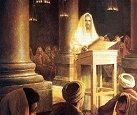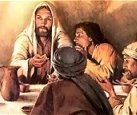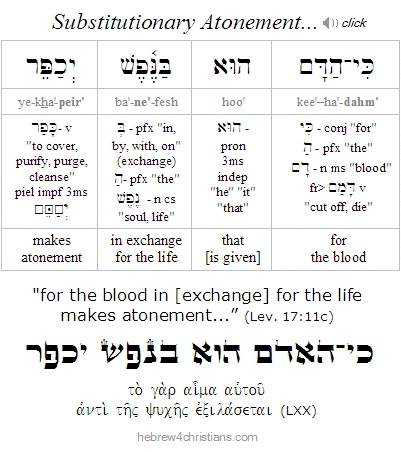|
I was recently asked how I interpreted and understood Yeshua's statement, "Unless you eat my flesh and drink my blood, you shall not have life within you" (John 6:53).
Well, as you likely know, the Torah strictly forbade Jews from drinking blood (Lev. 17:10-12). The life that was "in the blood" was reserved for sacrificial atonement upon the altar of YHVH (ūøų╝ų┤ūÖ ūĀųČūżųČū®ūü ūöųĘūæų╝ųĖū®ūéųĖū© ūæų╝ųĘūōų╝ųĖūØ ūöų┤ūĢūÉ). Yeshua's statement, then, is perhaps best understood as hyperbole meant to scandalize. Yeshua was trying to shake the disciples out of their preconceptions, similar to the way he dashed their hopes of a reformed Judaism when he predicted the coming destruction of the Holy Temple (Matt. 24:2). On the other hand, he was clearly associating his sacrifice on the Cross with the ritual of the Passover Seder....
Yeshua used many metaphors in his teaching. For example, in John's Gospel (from which the quotation about drinking blood comes), he called himself "the bread of life" (John 6:48), "the light of the world" (John 8:12), "the door" (John 10:9), "the true vine" (John 15:1), and referred to his body as the Temple (John 2:19). That doesn't mean we should consider him a loaf of challah, a cosmic lightbulb, a door with hinges, a leafy plant, or that his physical body somehow resembled the Temple of Herod...
When Yeshua taught at the synagogue in Capernaum, he referred to himself as the Living Bread (ū£ųČūŚųČūØ ūŚųĘūÖų╝ų┤ūÖūØ) that came down from heaven.

Just as the physical manna sustained the Jewish people in the desert, so the heavenly manna embodied in the life of Mashiach would sustain his followers forever. Yeshua identified this heavenly manna with the sacrifice of his flesh: "the bread that I will give is my flesh, which I will give for the life of the world" (John 6:51). When his audience questioned this, he went on to say, "Truly, truly, I say to you, unless you eat the flesh of the Son of Man and drink his blood, you have no life in you. Whoever feeds on my flesh and drinks my blood has eternal life, and I will raise him up on the last day. For my flesh is true food, and my blood is true drink" (6:52-53).
Some of Yeshua's disciples were scandalized by his teaching and said, "This is a hard saying; who can listen to it?" (Žā╬║╬╗╬ĘŽü╬┐Žé ╬ĄŽāŽä╬╣╬Į ╬┐ ╬╗╬┐╬│╬┐Žé ╬┐ŽģŽä╬┐Žé). But Yeshua then asked them: "Does this offend you?" (Žä╬┐ŽģŽä╬┐ Žģ╬╝╬▒Žé Žā╬║╬▒╬Į╬┤╬▒╬╗╬╣╬Č╬Ą╬╣). He further asked what they would think were they to see the Son of Man (ūæų╝ųĘū© ūÉų▒ūĀųĖū®ūü) ascend to where he came (referring to the idea of manna that came down from heaven). Notice his further explanation: "It is the Spirit that gives life; the flesh is of no avail. The words that I have spoken to you are spirit and life" (John 6:60-64).

Later, near the end of his earthly ministry, Yeshua celebrated his last Passover Seder with his disciples. It was there that he again spoke of "drinking" the "blood of the covenant which is "poured out for many for forgiveness of sins." He went on to say, "I will not drink of this fruit of the vine from now on until that day when I drink it new with you in My Father's kingdom" (Matt. 26:26-30). Note the context here: A Passover Seder. The fruit of the vine is represented by the (third) Passover cup (the "Cup of Redemption"). The same can be said regarding the eating of the Afikomen (matzah), identifying it with the breaking of his body. Luke's Gospel adds that this ritual act was to be done "in remembrance of me" (Luke 22:19). Paul later confirms the association as a symbolic act of remembrance, similar to other Jewish Passover Seders (1 Cor. 11.23-26). The shock value of the hyperbole Yeshua used was intended to show that this Seder symbolizes the new and greater Exodus, gained at the expense of his own shed blood and broken body. Moreover the Mishnah (Pesahim 10:6) interprets the Passover wine as a metaphor for blood that seals a covenant between God and his people. The life is in the blood. The cup symbolizes identifying with the life and redemptive mission of the Mashiach. It is not some ancient ritual carried over from ancient mystery religions and later incorporated into the idea of the Mass, etc.
Hebrew Lesson
Leviticus 17:11 Hebrew reading (click):
|




